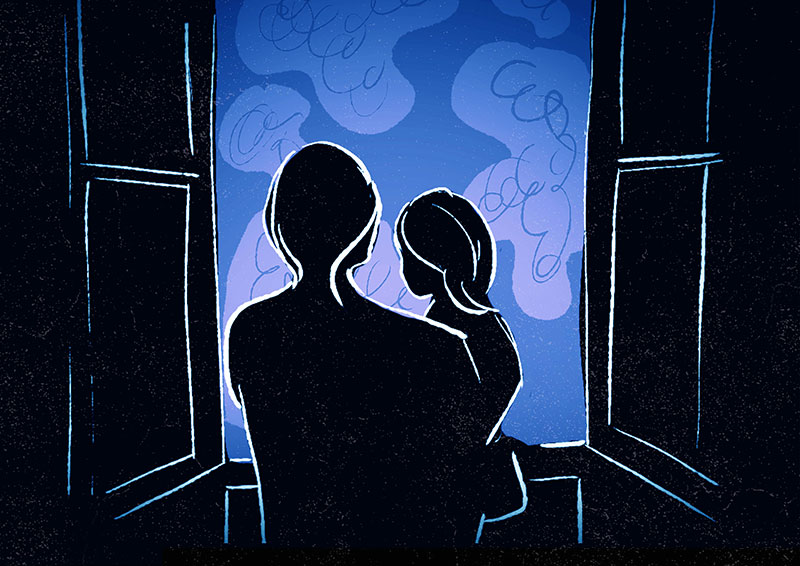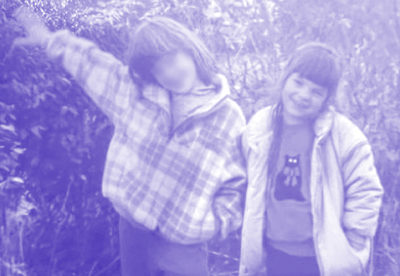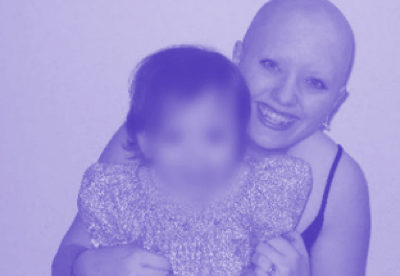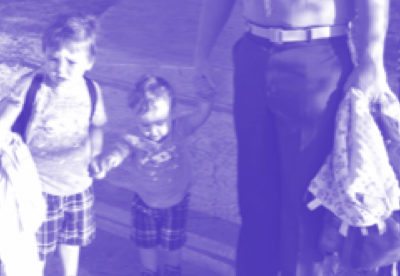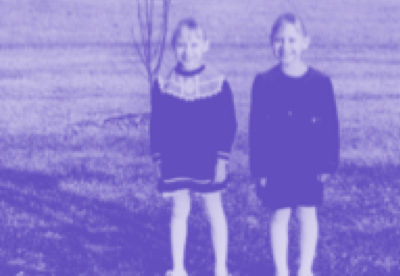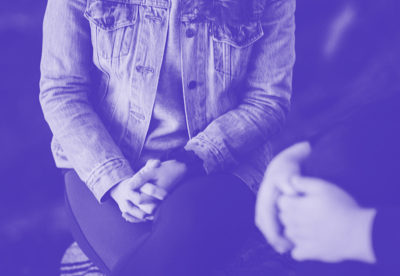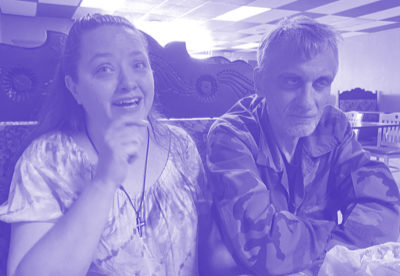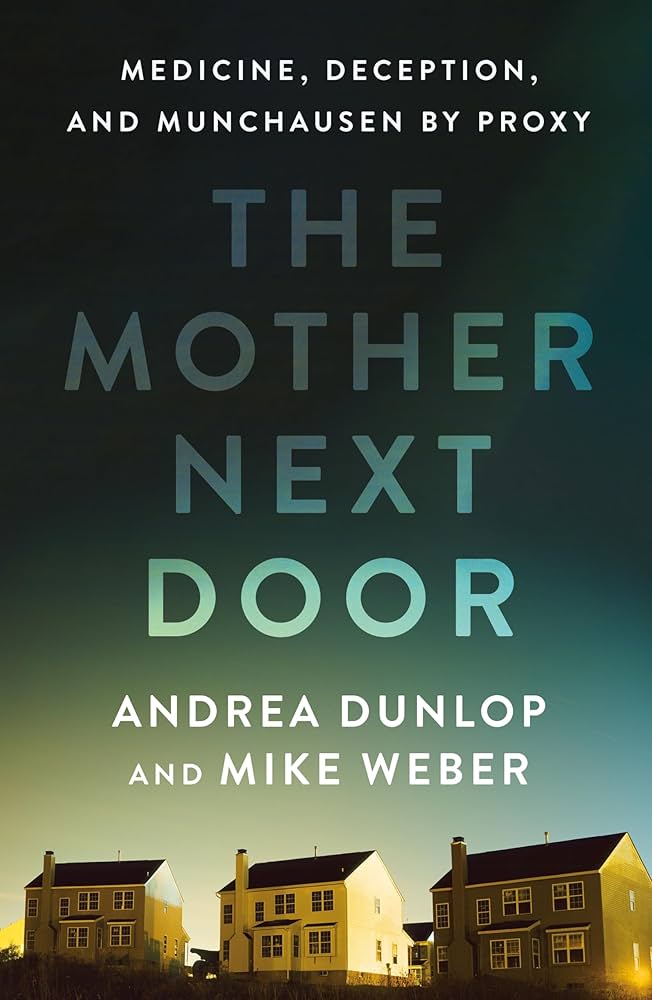SEASON 04 | EPISODE 01
Welcome to Season 4 of Nobody Should Believe Me! This season we are following the story of Jordyn Hope as they unravel the secrets of their childhood. After revelations that they were abused as a child, Jo bravely returns to their small, deeply religious hometown to attempt to unravel their many lingering questions about their upbringing. Was their abuse a secret? If not, why didn’t anyone help them? Jo connects with her first grade teacher and childhood best friend as they begin their search for answers. Andrea travels with Jo, hoping to help her friend find healing, and to see what the future might look like for the survivors in her own life.
Host Andrea Dunlop:
https://www.andreadunlop.net
For behind-the-scenes photos:
https://www.instagram.com/andreadunlop/
Support the show and get exclusive bonus content:
https://patreon.com/NobodyShouldBelieveMe
For information and resources:
https://www.munchausensupport.com
The American Professional Society on the Abuse of Children’s MBP Practice Guidelines can be downloaded here.
More about Dr. Marc Feldman:
https://munchausen.com
[00:00:00] Hi mom, it’s Jo. I hope you can hear me. I wish you could see me. I’m so sorry. I wish you called me. In the spring of 2022, Jordyn Hope made the nearly [00:00:20] nine hour drive from Missouri to Minnesota to say goodbye to their mother, who we’ll be calling Donna. Donna’s health had been declining and it had taken a sharp turn when she’d lapsed into a coma.
[00:00:32] Jo’s sister called and said, I think this is it. I just want to see you one more time. [00:00:40] Well, I see you. I want you to see me. I forgive you. I’m sorry. I’m sorry that you were hurting so much. I forgive you, okay? I forgive you. It had been a long time since Jo had spoken to their mother, [00:01:00] but even after years of near estrangement, Jo still wanted to be by their mother’s side at the end.
[00:01:05] And I love you so much. I just had to have boundaries of all to take care of myself too, you know? But I never stopped thinking about you, wondering how you were, hoping you’d get better. [00:01:20] My life is really good, Mom. Can you hear me in there? Can you feel me? I’m mad at you for not saying goodbye. It wasn’t very nice of you.
[00:01:30] I think after everything you owe me a goodbye.
[00:01:36] To say that Jo and Donna have a complicated relationship is an [00:01:40] understatement. Pulling away from Donna as an adult has been one of many steps that Jo has taken to attempt to save themselves from the lasting psychological damage of their mother’s abuse. And yet, to be here at their mom’s side was also a step.
[00:01:53] Because even the truth about their mom, as bad as it was, did not extinguish the love. But like [00:02:00] everything with Donna, even her death was not what it seemed.
[00:02:06] I’m Andrea Dunlop. Welcome to season four of Nobody Should Believe Me. This season, we will be following Jordyn and Hope as they unravel the many mysteries of their childhood. If you are a long time listener of our show, [00:02:20] you’ll likely recognize Jo, short for Jordyn, as they have done several previous interviews with us.
[00:02:25] Jo is not only a friend of the show, they are my dear friend in real life. We serve together on the American Professional Society on the Abuse of Children’s Munchausen by Proxy Committee, And Jo and I also work together for Munchausen Support, which is the only non profit [00:02:40] organization in the country dedicated to helping Munchausen by Proxy survivors and families.
[00:02:45] I think getting to know Jo over the past few years and especially getting to have really the honor of getting to know so much about their story, it’s really given me a sense of what’s possible. And I feel like often these [00:03:00] stories, when we’re hearing them in the news, they drop off after the court case and you never find out what becomes of the child at the center of it.
[00:03:09] And this is really that story of what human beings who have been through horrible things are able to become as adults. And [00:03:20] of the healing that can happen. I think Jo’s story can tell us a lot about the process of healing and the process of building a life after you’ve been through something unimaginable.
[00:03:40] A note about Jo at the top, they are trans and non binary. Jo interchanges what pronouns they use, but prefers they them pronouns, so that’s what we’ll use. But just a heads up that some of our interview subjects use she her pronouns when discussing their relationship to Joe or when they’re talking about Jo’s childhood.[00:04:00]
[00:04:00] We begin our story in Jo’s hometown of Hutchinson, Minnesota. So what’s the vibe of a Minnesota small town? Because I feel like small towns are, I think they’re kind of the same everywhere, but then they’re like, okay, just church. I mean, once you see Hutchinson, at least it used to be like
On a chilly February day where it is mercifully not.
[00:04:18] dumping snow, [00:04:20] Jo and I, along with my producer Mariah, drive out to Hutchinson, a small rural town outside Minneapolis. The streets are lined with all of these huge trees that are barren now in the winter, but you can imagine them making this beautiful leafy canopy in the warmer months, and there are rows and rows of [00:04:40] small craftsmen houses, and as Jo said, a lot of churches.
[00:04:46] Jo has come along on this journey with us. bravely to do something that I feel like you mostly see people doing in movies. Returning to their hometown to try to get to the bottom of their often confusing childhood [00:05:00] memories. To return, literally in Jo’s case, to the scene of the crime.
I grew up in a few different houses.
[00:05:08] So, I don’t remember much. I know when I was born, we lived in an apartment. But I don’t really remember that. We, I lived in Hutchinson my whole life, which is like a very small town [00:05:20] in Minnesota. Um, like the next, nearest town was probably like 30 minutes away. So very secluded, um, and isolated just as a town itself.
[00:05:32] Like what are some of your earliest memories? Hmm. That’s a really [00:05:40] hard question. I feel like to answer. I feel like a lot of. memories I just were repressed for so long and I didn’t even really get until seeing my records, but some of my earliest memories would be being in the hospital sick a [00:06:00] lot, um, missing school, not being able to like go out and play with friends, um, but then also I have a lot of memories of playing with friends and a lot of memories of Getting McDonald’s with my mom.
[00:06:17] We all misremember our childhoods to one degree or [00:06:20] another. But Jo’s is a different story because their history is so obscured by their mother’s manipulations, her interconnected webs of deceit, not only around Jo’s health. But around every facet of their lives together. The idea of unraveling it all is beyond daunting.
[00:06:37] So we’ve come to round up some witnesses. This is [00:06:40] um, yeah, this is very rural. Yep, this is it. Cornfields. Oh yeah, when I was little we would like play hide and seek and like hide like in the cornfield. Which I think is like dangerous. But we weren’t going that, so. This is like the main [00:07:00] street. You hit everything and hutch down this street.
[00:07:03] Okay. You guys have a target, look at that. We do have a Target. That, that was there. It wasn’t as popular as Walmart, though, so. What is Minard’s? Minard’s. Minard’s? I really, please put that in. [00:07:20] Okay, so obviously I did not grow up in the Midwest. The drive into Hutchinson is beautiful, but too expensive.
[00:07:26] Pretty sparse. There are all these lakes glittering under the winter sun and lots of empty cornfields. Very few signs of life. This really is the middle of nowhere. I went to this church where[00:07:40]
[00:07:41] they said today we’re going to speak in tongues. Into
[00:07:47] that church across the street. I see another church. Not exaggerating, as we drove around, there was a church on almost every corner.[00:08:00]
[00:08:02] Jo lived in Hutchinson for their entire childhood. And driving through the place, it looks like a sweet, nice place to raise kids, honestly. And you know, we have a pretty strong archetype of what places like this are supposed to mean in America. Small towns are supposed to be the places where people look out for one another.
[00:08:19] [00:08:20] Or, alternatively, some see these as places that are not so tolerant of outsiders. Our first stop is the elementary school that Jo went to as a kid. We pull up outside a few minutes early to a very chaotic and familiar scene as school is letting out and a long line of SUVs and sedans snakes around the block with [00:08:40] parents waiting to pick up their kids.
[00:08:42] I shouldn’t generalize, but a lot of people who live here grow up and stay here. They marry each other and you know, then, you know what I mean? So, A lot of our teachers are homegrown. That’s why I call them homegrown Hutchinson people. [00:09:00] Um, so that was, I felt like the town was kind of, I don’t want to rip on Hutchinson, but I felt like it was a little clicky.
[00:09:08] [00:09:20] See you. Hi, I’m Jen. Nice to meet you. Can I give you a hug? Yes.
Jen Becker, or Mrs. Becker as Joe remembers her, was then and is still a first grade teacher in Hutchinson. The two hadn’t spoken in well over a decade, but their reunion was warm.
I’m sure it looks very, very different. I always felt so safe. [00:09:40]
As a kid, my memory was like, kid brains are interesting, so I was like, Mrs.
[00:09:45] Becker is really pretty. Oh! Um, and that was like, the biggest thing I remembered about you. Oh, well that’s nice. She’s so pretty, she’s so nice. Well, like, I don’t know if you remember anything about me that, that, that. I remember you [00:10:00] were, um, you were quiet. And you always looked super tired. I remember that.
[00:10:07] I remember that. I remember that. I was like, a little worried about you, so I brought you, we had like a, we have a, it’s called something different now, but we had a team that, where I would, I don’t bring you to it, but I bring your, [00:10:20] your case to them, to talk about you, cause I was worried about that you seem so tired and, It was like a little bit harder for you to concentrate sometimes.
[00:10:32] I don’t remember academically anything, but I remember you being a very sweet, sweet kid. I remember you were [00:10:40] kind of sickly. Um, your mom was very super mom, kind of. She was, did she like run the gymnastics program here? Yes. Um, I remember that. I remember her saying you were going to be like a superstar.
[00:10:56] gymnast. Um, but she would come in here and kind of be [00:11:00] mama. Like she’d act like mama to everybody in our, in our room. Like the mom of the year kind of thing. That’s what I remember about her. And, but, and I remember her always being concerned because she said you were like ill or sick or they were trying to figure out what was wrong or [00:11:20] whatever.
[00:11:20] She was more of the I’m like such a role model for everybody kind of thing. And I’m not putting your mom down. Um, tried to make herself look really like a, yeah, this super mom. I always had like a little bit of a uncomfortable feeling about it. Um, but there was never anything [00:11:40] concrete that I could do. I was like probably in my second, third year of teaching.
[00:11:47] So. You know, I’m just like, doubting myself and, um, so I’m always, I was just kind of like, well, it doesn’t feel right. What Mrs. Becker says about her memories of Jo’s [00:12:00] mom sounds extremely familiar to me. In interviewing people about these cases, they frequently describe a bad feeling that they just can’t quite put their finger on.
[00:12:10] Mom seems involved, loving even, but something is just off. So I feel like a lot of Memories, I just were [00:12:20] repressed for so long and I didn’t even really get until seeing my records. One of Jo’s earliest memories really belies the distance between their mother as they experienced her and how she tried to present herself to the outside world.
[00:12:33] Jo doesn’t remember a time when they weren’t sick, and their mom was often pushing them into the spotlight in one way or another. [00:12:40] One of these memories is being a state finalist in Minnesota’s American Petite Princess pageant at age four. I have very faint memories of it. I’m pretty positive my church sponsored me and paid for it.
[00:12:56] At the time I was supposedly really [00:13:00] sick, so I’m not really sure. It’s a little odd to have someone that’s super sick all of a sudden. wearing this like really pretty dress and putting on a show for people. But that was kind of, I think the theme of my life was one day I was dying and the next day I was doing back walkovers across the grass.[00:13:20]
[00:13:20] So it definitely was fitting. My mom, I remember I, I guess I like grabbed the curling iron like right before we went on and burned my hand pretty bad. And I remember like crying and like screaming because I was in pain and it hurt and my mom [00:13:40] was like, you need to stop. You need to go out there and perform.
[00:13:43] Um, so that’s like one of my first memories I would say of where like, It was like the opposite, where my mom didn’t want me to be sick, where like, me being in pain was not convenient, and it was not the time for it, because it was gonna actually take attention [00:14:00] away from her, and so I had to just act like I wasn’t in pain and go and perform and do And I ended up getting runner up at the pageant because my mom, there was a girl that was too shy and wasn’t going to go out and my mom ended up helping [00:14:20] her.
[00:14:20] So she went out and then she won. I still have a little bit of a grudge. I was supposed to get to go to Disney World but since I got runner up, I didn’t get to go to Disney World. And, my mom ended up, ironically, winning Best Mom Award. And, that [00:14:40] I remember, like, she always made a big deal of it, of course.
[00:14:43] It was like a really big thing. Cause it proved that she was this great, loving, caring mom. In the beauty pageant, they had a best mom category. Yeah. So sometimes I really do think back and I’m like, did, was that a real thing? Like, is that what the award really said? Cause that is [00:15:00] kind of like an interesting, like, what, what kind of beauty pageant was this?
[00:15:05] I don’t know. So. Who’s to say? That’s what I remember, and I remember my mom making a big deal about it, and I remember me being really annoyed because I didn’t get to go to Disney World, and she didn’t care, because she got Best Mom Award. In Jo’s [00:15:20] memory, their mom successfully fooled everyone as thoroughly as she’d fooled those pageant judges.
[00:15:25] And it’s only right now, in the midst of their conversation with Mrs. Becker, that Jo realizes maybe their mother’s abuse wasn’t so well hidden after all. Did you know Jen had ever made [00:15:40] a report about you? No. I didn’t know. I don’t think I knew that anybody in school knew. I, my interpretation, not in school.
[00:15:56] First or second grade or third or even any of that but probably [00:16:00] like fourth grade on my interpretation was that everyone thought that I was faking illnesses and I just wanted attention and I was just this like kind of bad rough around the edges kid. Um, I didn’t Yeah, I didn’t it didn’t seem like anybody had any [00:16:20] any idea.
[00:16:21] Mm hmm. Yeah. Well, it was just like I said like a I don’t know what it was. Like a feeling. I, it just, um, with your mom, it just didn’t feel right. It just felt forced, I guess. I don’t know what the word would be. You were probably one of my very first kids that I did a report [00:16:40] on. So, and like I, like I said, I was, I was like young.
[00:16:45] I was like in my fourth year of teaching or whatever. And you doubt yourself all the time. I see things and I have inklings about things, but I can’t really, what can, like, legally, what can I [00:17:00] do besides do a report or whatever. Yeah. I can’t go to your house and, like, take you out of the house. Yeah, I think we talk about that so much.
[00:17:10] Everything you’re speaking to. I know you were like, I don’t know that I have much to say. But, like, literally this has been one of the most helpful conversations I think I’ve had. Well, that’s good. [00:17:20] Yeah, I think that there’s so much. Everything you’re speaking to speaks to the systemic issues. And I think whether or not I was, like, one of your first reports, or even if I had been your hundredth, like Mm hmm.
[00:17:33] Like you said, there’s only so much that you could, and the reality is like, you are still a [00:17:40] reason that I’m sitting here today. You were that safe enough person in my life at that time that helped me survive that year of my life. Jo and Mrs. Becker share goodbyes and we walk back out into the empty hallways of the elementary school.
[00:17:55] They’re wonky artwork and kid sized chairs and sinks.[00:18:00]
[00:18:02] It was so good. I had no idea about the reports.
[00:18:10] That, that is like, Ah, I feel like it makes me mad. All over again. Like, so many people knew. So many [00:18:20] people knew. Yeah.
[00:18:28] It’s weird.
[00:18:32] I think it’s easier thinking that nobody knew. Thinking that, like, I just hid it really well, versus
[00:18:54] For Jo, remembering their childhood can feel like putting together a puzzle that’s constantly [00:19:00] rearranging itself. Jo thought their mom had everyone fooled, in part because plenty of other adults seemed to trust her. Tell us about Donna just as a person. Yeah, she, when I was little. I would say pretty well respected.
[00:19:17] Like I said, she [00:19:20] taught Sunday school, um, so at my church, which I think she just kind of did things wherever I was going to be. She also had a daycare. She had kids coming over to our house all the time that she supposedly cared for and things like that. Um, Also [00:19:40] growing up weirdly, we always had people living with us.
[00:19:44] One of my sister’s friends pretty much grew up with us for a very long time, was living at our home. Some of my cousins stayed with us for a really long time, which very odd now when I look back at it, [00:20:00] but she. always seemed to be around kids taking care of people. Um, when I was pretty young, she started coaching gymnastics, which I was a part of.
[00:20:11] And she did that, I mean, until I was a teenager. So she did that for a very long time. And [00:20:20] a lot of people really, like I said, respected her, really liked her. And then on like the flip side, you know, I remember going riding in the car with her to the liquor store. And her having me sit in the car, and I would sit there, and when people would be walking out of the liquor store, I’d roll my window down, and I’d yell, [00:20:40] Jesus loves you!
[00:20:41] And then I’d roll my window back up, and I’d duck down, because I was kind of scared. But I remember, like, that was this fun little game that I would play right outside the liquor store to all the people that had no idea what they were doing or who they were or what was going on. And I thought They’re just running in for errands.
[00:20:58] I didn’t really understand what alcohol [00:21:00] even was at that point. I can’t really remember many people not liking her or being afraid of her or not trusting their kids around her when I was really little. That changed a lot as I got older.
One of the people who spent a lot of time around Jo and their mom as a kid was Jo’s [00:21:20] friend Bree.
[00:21:20] I’m really excited to see her. Yeah, me and Bree were like best friends, pretty much like 8th grade through senior year. Um, we were like inseparable. People would always joke that we were like dating, um, cause we were just always together. [00:21:40] Always together. Um, yeah, I, I spent a lot of time at her house. She spent a lot of time at my house.
[00:21:47] You pull up to a house with a red barn next to it and a frozen lake behind it. Walking into the house feels like a Minnesota Pinterest board come to life. There are little signs everywhere with funny [00:22:00] sayings, many involving puns, and there’s a cookbook on display with hot dish recipes. There’s kid paraphernalia everywhere.
[00:22:06] And a very sweet, sleepy dog who curls up in his bed after giving Jo, Myrriah, and me a thorough inspection.[00:22:20]
[00:22:23] Bree and Jo met as kids at their church confirmation, but didn’t really become friends until middle school. Bree would eventually go on to marry her high school sweetheart, and she still lives in Hutchinson. Just tell us a little bit about Hutch from your perspective.[00:22:40]
[00:22:43] Um, small town, uh, lots of people. Watching Jo with Bree is incredibly sweet because, like we all do around people we grew up with, they morph back into the teenagers they once were as they giggle and reminisce. Drama? I [00:23:00] don’t know. Is everyone kind of in each other’s business? Yeah, well at least for school it was.
[00:23:06] Yeah, I feel like it was. Oh my god. Yeah, yeah, everybody knew everybody. Everybody knew everybody’s business. What was that? Where did you hang out? What would you do? What was the draw? We just go to like Walmart. That’s what [00:23:20] I said. I was like Walmart. Walmart, that was like, yeah, that was the place. Yeah, literally just the stupidest things.
[00:23:26] I don’t know. Just the only thing to do. Small town shit. I don’t know. We’re driving around. I was just gonna say. We would drive around for hours. Doing literally nothing. Literally nothing. But we would always [00:23:40] like be in the car with the boys. And they’re just like whipping. Yeah, whippies, shitties, like all over.
[00:23:46] Yes. Donuts. Yes, I knew that was a Midwestern thing. Whippies, shitties. Yeah, we’d like sit on Main Street, in like the Genesis parking lot, just [00:24:00] like, do stupid stuff. Bree knew Donna well, because in addition to being her best friend’s mom, she was also their cheerleading coach. Can you all talk a little bit more about like, cheer, what was cheerleading like, did y’all do competitions, what was it just like?
[00:24:13] for games and stuff. Just competition. Not in school. Hutch banned, or not banned, but they got rid [00:24:20] of cheer. Like, right before we, Well, you were in it. Yeah, I started cheer in 6th grade. Um, and did it. And then, um, in 8th grade, Eighth grade or something I want to say We had this coach that we like went to our homecoming game and at like right before the game started our coach like walked out on us [00:24:40] because supposedly we were bullying her daughter, which Didn’t happen.
[00:24:44] It was so weird But so they like literally she like walked out on us and we weren’t able to cheer the homecoming game which at the time felt like a big deal a big deal we had like our routine like all these things and There was like a cop like standing there like all these it was like Very dramatic, you know, Hutch [00:25:00] drama.
[00:25:00] And so then, so then my mom was like, Oh, I can be the coach. Um, so then
[00:25:10] my mom started coaching and it became an all star team. So we no longer did anything. Nothing through the school. Yeah. Cause you guys were like the Hutch tigers. [00:25:20] Yeah. What was, I don’t know. We were the, Midwest All Stars. Yeah, when we became competition, yes. Our colors were teal and zebra. We were like, when we would do competitions, we’d be like the only one.
[00:25:36] So we’d win, which is [00:25:40] cool and all, but we’d be competing against nobody. Like, I don’t know if we just sucked, or if there was just, like, we were in such a small, like, rank. I feel like my mom, like, had to have, like, purposely put us in a big set. So then we could always win. Yes, because she would be like, you guys got number one in this.
[00:25:59] Yes, [00:26:00] and we’d always get number one. Drop every single stud, and like do so horribly. I feel like we were not very professional competition cheerleaders. It’s just like, so embarrassing. So embarrassing. Yeah, we [00:26:20] got first. We’re winners. We were really good. We were winners. We were really proud of ourselves.
[00:26:29] Team size. And it was like, you could find a way to then like, oh, she found a way. She found a way. Um, interesting. So was, was [00:26:40] Donna being drunk at practice? Something you, you remember? Oh, a hundred percent. Bree pulls up a photo and these uniforms are exactly as spectacular as they sound. Bree and Jo clearly had a lot of fun together growing up, but Bree glimpsed the dark side of Jo’s home life too.
[00:26:56] Uh, what is it what Jo’s house [00:27:00] was like? Um, we would mostly stay in her room or do stuff in the kitchen, but then for the most part we’d be outside. Like they had like a playground. I know we were a little bit old for that, but whatever. And then really just like go to the neighbor’s house and like walk around and yeah, never really [00:27:20] like, do you remember the town, the townhouse?
[00:27:20] Yeah, yeah, yeah. We were there. We had hung out in the house a lot, but at the same time, not really. Yeah. We try to avoid her mom at all costs. Oh, you’re like unlocking. Do you remember? Oh my God. Do you remember? When we were like washing dishes and my mom was like drunk, but we were like so afraid of her.
[00:27:39] [00:27:40] So then I made the song, gosh, do you remember the song? It was like, oh my gosh, I don’t remember the song, but I remember the song. I don’t remember. It was like washing dishes with Bree. It’s just my friend and me. Oh my God. Doing the something very carefully. Oh my gosh. Because if I wake up my mom, she’ll drop the F bomb and then I’ll have to run till I see the bright sun.
[00:27:59] Yeah. [00:28:00] If she wakes up, she’ll look and say sup, and then something, something bad would happen. Yeah, don’t wake up mom. Don’t wake up mom. She was usually drunk in the living room, and that’s where she like, stayed the whole time that we, I’d be over. She never did anything. So you didn’t, sounds like you didn’t really [00:28:20] have any interactions with her.
[00:28:21] Yes and no. Like, I’d like, I was very cordial with her. I think she liked me, and we would like. I could go in and talk and like, she’d be my mom, like, whatever. But I never really had, like, a whole lot of interaction. I really just went over there just to hang out. Yeah, she was really nice to you. Like, [00:28:40] she really loved you.
[00:28:41] I was just always there. Jo, do you remember, like, was there a difference with your mom’s behavior when there were other people there versus when it was just you and her? Um, I mean, definitely. I think That was like always, I mean, I think Brie probably saw, like, I saw some, she [00:29:00] got really mad sometimes where it was like, you shouldn’t be here.
[00:29:05] But like around adult, she was a lot nicer and normal. She tried to pretend to be normal. Yeah. Yeah. Yeah. She definitely play like that. Like I’m so happy and loving and kind. I’m such a good mom. [00:29:20] I’m such a good mom. There were other signs that something was amiss in Jo’s house. But I definitely remember the kitchen meds.
[00:29:28] There’s so many. Just like bottles of pills everywhere. Yeah. All over the counter. Yes. And like in the cupboards. Where like cups were. Yeah. Not normal. Not normal at all. [00:29:40] At that time was your mom claiming that you and or her had a specific chronic illness? Um, I mean I had severe asthma. Yeah, oh my gosh, yeah.
[00:29:55] I forgot about that. She would always, like, at cheer, like, would be [00:30:00] like, Jo, you can’t run or you can’t do this because you have asthma. And I’d be like, I’m fine. I’m fine, yeah. And then she’d be like, use your inhaler. And I’d be like, no, I’m not gonna, like, I just have to breathe. Yes. Um, because I thought I was, like, invincible.
[00:30:14] I thought I was, like, beating asthma. Yes. Because I thought I had it, but I didn’t. No. I didn’t. My, I [00:30:20] remember my mom had a. Clear like a Gatorade bottle all the time that had vodka in it Yeah um and it would just be sitting like on the back thing and she would always go and just take a drink and then she had These like these like breath strips or something that she would like take after that.
[00:30:37] Oh, yeah Like the cleat not clear things, but yeah the [00:30:40] little strips. Oh, yeah, these weird little you like put it on your tongue Um the water bottle or whatever she would put it in was like everywhere everywhere. She’d bring that every Always had that Gatorade bottle And I remember one time as a kid, I was like, Mom, can I have a drink of water?
[00:30:54] And she was like, No, don’t touch that. And I was like, so confused. Because I was like, I don’t, okay. [00:31:00] Yeah, like, why? Jo thought their mom was better at disguising her many issues than she actually was. But the fact that she was pretty much constantly intoxicated appears to have been an open secret.
I remember, like, the last, like, year or two of being friends, like,[00:31:20]
[00:31:20] It seemed like more abuse was going on and like, um, I know I talked to my mom about it and was like, we need to get her out of there, blah, blah, blah. And I know at one point I was over and we were like, we need to record your mom. So like being drunk and stuff and the things she would say to her, but I guess like that was more towards the end.
[00:31:38] When you [00:31:40] say towards the end, like around what age? Like 16. I don’t know when we like stopped being as close. Probably after I started dating Max. Yeah. I lost touch with a lot of people. Yeah, um, probably like 16. 15, 16. Did you, do you feel like [00:32:00] you knew, like, at the time that, like, not all of it was real? Or that it, like, seemed dramatized?
[00:32:03] Yeah, like, but I would have never said anything. Because, like, I didn’t know anything. Yeah, I feel like when it came out that it was all a lie, I was like, yeah, I knew that. Yeah. Obviously.[00:32:20]
[00:32:23] Online. Like when you did the story. The doctors? Yes. That’s when it, that’s when I was like, oh, okay. Yeah. That makes sense. Jo first went public with their story on social media prior to making an appearance on the CBS TV show The Doctors. We will get into that in a [00:32:40] later episode, but this was the first time many people in Jo’s life heard about the abuse that they had endured.
[00:32:47] So you, you weren’t shocked. Mm mm. It made things kind of fall into place for you. Yeah, definitely. None of it shocked me. Yeah. None of it shocked my mom either. Mm mm. Which is sad [00:33:00] because I feel like my mom didn’t really like even know the full extent of it, but like she knew Mom Yeah
[00:33:12] Nope I don’t think I’ve ever even heard of it before before that so yeah What did it feel like to kind of have [00:33:20] that Confirmation that you’re like, oh my my intuition was kind of correct. It felt really shitty. I feel like I wish that I had Known more than, obviously I was a teenager so There’s not much I could have done, but I felt really bad because I feel like There were signs and we knew things and I feel like we were [00:33:40] trying to like help but I feel bad that there was no way to help really That you were a part of it for so long and I was a part of watching it for so long Yeah shitty What does that feel [00:34:00] like to her, Jen?
[00:34:01] Um, Yeah. It’s really a lot. I think it’s like, I mean, you were like my literal best friend for so long. We were like sisters for a long time. So long. Yes. And I think like you definitely knew probably the most out of literally anyone [00:34:20] in my entire life. Yeah. And I didn’t even like know, right? Right. So it’s just like, and like you said, like yeah, I remember like Trying to do like plotting of how like, yes, you can get me out of the house.
[00:34:30] Like we knew that your mom was terrible. Mm-Hmm. . And we knew Mm-Hmm. She was not a fit mother. Mm-Hmm. . And she shouldn’t. Yeah. But, [00:34:40] but I still thought I was sick. I guess I, I thought yes, a lot of it was real and at least safe for the most part. Like she was still your mom, so she had your best interest in mine.
[00:34:51] I’m hesitant to judge the adults surrounding Jo too harshly, but what the hell? This lady was just constantly drunk at cheer [00:35:00] practice and no one intervened? You know, the comfort of living in a small town, which by the way I also do, although it’s certainly not one as isolated as Hutchinson, is that people are supposed to look out for each other.
[00:35:12] Why didn’t someone do something about Donna?
[00:35:20] But then again, as is often the case with these offenders, Donna was skilled at eliciting sympathy.
Your mom was broken too though. She would always like be sick or like injuring her, injuring. Do you remember that with her? Was it like kind of every time [00:35:40] you had an interaction with her, was there like a, Oh, and just my back or my thing or something was like, yeah, just like, It was normal.
[00:35:50] Yeah. I don’t know. It was there, almost. Yeah. Yeah. Jo, just to the like, question of how many meds were on hand, [00:36:00] were you taking all of those meds? Were you taking them sporadically? Was she getting them prescribed for you and then hoarding them? Like, do you have a sense of what, what was going on there? I think it was pretty sporadic.
[00:36:12] Um, like, I, like, there were, I feel like, hundreds of like, meds. Probably hoarding, not [00:36:20] taking like the full doses. Yeah, hoarding them. Lots of like antibiotics or like things like that. Um, yeah, I remember like one time my mom like, you could see like when you were sitting in the living room, there was like a mirror that kind of like shined, like you could [00:36:40] see into the kitchen, and my mom like overdosed on meds like with vodka, and In the kitchen, um, and I, I couldn’t call the cops cause I couldn’t do that to her so I like told my neighbors and they like had to call the cops and I had to like stay at their house for the night, um, [00:37:00] cause my mom was just crying about how she didn’t want to live and how horrible she was, um, usually more about how horrible I was.
[00:37:08] I was gonna say I feel like a lot of it was you were a horrible child to her. She didn’t want to live. That was the reason she drank. Did she, do you say that because [00:37:20] Jo reported that to you, or did you actually hear her mom say that about you? Her telling me stories and seeing it firsthand. It wasn’t very often that she like would talk like that to her, because she put up a front, but like Get her drunk enough.
[00:37:35] Yeah. Yeah. Definitely knew she was not a fan of [00:37:40] you. And that you ruined her. I ruined her. Yeah. Which to me back then was like, how? You were the best. Like, I don’t understand. She like, does everything for you. Everything she does is because she wants to please you. What Bree says about Jo here really hits me, because [00:38:00] Joe is the best.
[00:38:01] They’re always looking out for everyone around them, and Jo and I know a lot of people in common. Everyone loves them now. It’s not a surprise to me to hear that everyone actually loved Jo growing up, but before this trip, I know that Jo believed the opposite. Their mom told them, Over and over again, that they [00:38:20] were a bad kid, so they thought that everyone else must think so too.
[00:38:24] That’s the influence that our parents have on us. The things they tell us about ourselves, for better or worse, bury themselves pretty deep.
[00:38:36] Jo, I’m really interested in the way that you just phrased that, where you [00:38:40] said, I didn’t call the police because I couldn’t do that to her. Why did you think Because I think calling 911 would be, like, the most normal response. Like, what did you, did you feel that was somehow a betrayal of your mom? Yeah, I mean it goes to what you just said, like I, [00:39:00] I like really thought I was like the problem, like I really, it’s like at times like yeah I would like look for the alcohol but it was cause I wanted, I thought if I could like take the alcohol from her then she would like stop drinking and be nicer and like um, I always just thought that like yeah I was the problem.
[00:39:18] I was why she drank. I mean she said. [00:39:20] If I could. She, if I wasn’t alive, she would stop drinking. Um, so like, I don’t know what else I was supposed to believe. Um, and yeah, she would always just say that I was like this bad kid. And even with everything going on, like all I wanted was her to love me and like approve of me for me to be enough.[00:39:40]
[00:39:44] Yeah. Like there were times that when the cops were called, um, several times throughout my life, um, because of her drinking. Um, and they, cause like. They would have to take her to the hospital and whatever to like detox and stuff. And that’s like [00:40:00] when my extended family would come over like that day. And then they would have me show them where all the pills and all the alcohol were.
[00:40:07] And then they would throw all of it out, not in the garbage outside. Cause we knew that she would like dive in the dumpster. So we’d have to like bring it to someone else’s house. Um, but then that’s when they would like have me go [00:40:20] stay at like my uncle’s house or something because they knew like when my mom got home from the hospital, like she would literally kill me.
[00:40:26] Um, because it would be my fault even though like I was just doing what I was asked to do by my family. And like, I always felt really weird about it all cause I didn’t understand like the alcohol or the pills or [00:40:40] like any of that sort of stuff. Um, but I wanted her to feel better. So like I would help, um, But I knew I would get in so much trouble.
[00:40:51] Jo’s mom Donna was clearly struggling with addiction and with her own mental health issues. But it doesn’t excuse her actions. Someone should have protected [00:41:00] Jo and held Donna accountable. And yet, when adults in Jo’s life did try to help, they met with dead ends. And those times when Jo attempted to reach out for help on their own, it often backfired.
[00:41:11] My mom taught Sunday school and I grew up in a like Missouri Senate Lutheran church, and once she stopped [00:41:20] teaching Sunday school, we stopped going to church, but I started going to church with my neighbors and I had gone a little bit with some other people before this, but I started going with my neighbors to an evangelical free church and I really liked it there, but I guess maybe because my, that was when.
[00:41:39] I was a [00:41:40] teenager. I was probably 14 ish. And so that’s when I started to kind of break away from my mom a little bit. And I think she felt threatened by that. High school is the first time I ever told anyone anything that was happening in my home. Prior to that, when I started getting more involved with church, where I started, I [00:42:00] opened up to my neighbors.
[00:42:01] And my youth leader, uh, for youth for Christ. He was the first person I ever told anything that was happening. But all these people then that started to be in my life that were involved in church started to, uh, I think I was making up illnesses and stuff. So then they started to use the [00:42:20] Bible against me.
[00:42:21] Um, and they would always use this quote, do you want to be well, then pick up your mat and walk. And they would always use that as like a, it was my choice to be healthy. And I could, would always do these testimonies at church and like through these little groups I was in where I would talk about how sinful I was and how bad [00:42:40] I was and how God saved me.
[00:42:42] And it wasn’t until. Getting out of that state, like literally getting out of Minnesota that I was able to like really wrestle with religion and like really deconstructing religion, but I had to do so much and I still struggle with this concept of like, [00:43:00] I’m evil and bad. Cause one, I learned that that was just like my core beliefs because of what was going on in my home and how I was like taking in how people were reacting to me.
[00:43:10] But then two, I was told, you know, the Bible says you’re born sinful and like, you can only like be good if Jesus is in your heart. And [00:43:20] so I just always like had all these messages that were just thrown at me that I was the bad one. You can tell, even from a quick drive through town, that in terms of places in Hutchinson that one might go to for support, the choices were going to be the church or the church across the street.
[00:43:38] And Jo quickly [00:43:40] realized any help those institutions might offer came with big strings attached. I kept thinking as we were driving around this town, about that country song that came out last year, Try That in a Small Town, by G. Smeldine. Thought about how this song sounded to some people like a patriotic love letter to tight knit communities where people take care of each [00:44:00] other.
[00:44:01] And it sounded to others like a sinister warning to people who might try and stand up for themselves in a place where they’re not welcome. And the truth is, we saw this duality in the story that we covered in season two. It was, in part, I believe the tight knit nature of the community surrounding Alyssa Weyburn, the victim in that case, [00:44:20] that finally brought her abuser to justice and landed Alyssa, ultimately, in a safe and loving home.
[00:44:26] And you would hope that people in a place where everyone knows each other would really look out for one another. But maybe it can make situations like Jo’s worse. Maybe it’s easier to report on a person you suspect is abusing their child if you’re not going [00:44:40] to see that person every single day at the grocery store for the rest of your life.
[00:44:44] Maybe insularity breeds its own kind of silence. Or maybe a town of any size is only as good as the people in it.
[00:44:58] Next time, we’ll take a closer look [00:45:00] at Jo’s home life from the person who lived it with them. Because mom’s favorite phrase growing up is, I brought you into this world, I can take you out.
[00:45:11] Nobody Should Believe Me is written, hosted, and produced by me, Andrea Dunlop. Our senior producer and editor is Mariah Gossett. Greta Stromquist is [00:45:20] our associate producer. Engineering by Jeff Gall. And administrative support from Nola Karmusch. Music provided by Johnny Nicholson and Joel Schupach. With additional music and sounds from SoundSnap.
[00:45:33] Thanks to Cadence3 for recording support. Special thanks this week to Jen Becker, Brianna Garrity, [00:45:40] and the many people of Hutchinson who welcomed us into their homes and workplaces.

